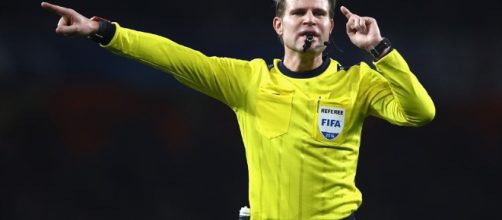Five minutes into added time of the first half, midfielder Erik Lamela makes a bad challenge, a sign of possible frustration at his team's two disallowed goals, one of which was his. The challenge earns Lamela a yellow card, but then came the sight that came to define the match, Referee Paul Tierney puts his finger to his ear and Wembley stadium groaned as one.
The dreaded finger to the ear that elicited a collective hand to the forehead from 80 thousand Spurs and Rochdale fans on that snowy Wednesday in February, was the referee signalling for Video-Assisted Referee (VAR), for the sixth time in forty-five minutes.
These six times included two disallowed goals and two agonising waits before the half’s two allowed goals were eventually given.
On what could have been a magical night, where a league one side was playing champions league opposition at Wembley stadium, for a place in the last eight of the FA Cup, which saw seven goals and some incredible performances, it goes some way to explain the scale of the fiasco that all the headlines the next day were about VAR.
"The first half was a little bit embarrassing for everyone," said the Spurs manager Mauricio Pochettino in his post-game press conference. He continued, "I am not sure that system is going to help. I think football is about emotion, if we are going to kill emotion, it's not so happy what we have seen.”
The VAR debate rages on
The addition of Rugby style Video Referees has been a contentious issue, with some suggesting that it slows the game, creates confusion, and takes the anarchic fun and cathartic pleasure of endlessly debating a bad decision.
This latest example serves to highlight the irony of the consistent controversies arising from a technology designed to remove controversial decisions from football and has added fuel to the fire of the naysayers.
"It's comical at times, how long it's taking and nobody knows what's going on." Said Jermaine Jenas former spurs and England midfielder on BT Sport.
Another former Spurs legend Osvaldo Ardiles chimed in on twitter, “Doesn’t matter what the result is, VAR is making the best game in the world and the game we love so much degenerate into a farce. Just a mockery of a game.”
However, there are still voices that defend the innovation.
"Human error will still occur with VAR, other sports have shown that, but it dramatically reduces the number of errors” suggested Mark Schwarzer on BBC Radio 5 live after the FA cup game.
“VAR is good for the decisions the referee didn't quite get right or maybe didn't even see. People will still celebrate, players will still continue, but I think once we get more clarity I think it will flow better.”
The data favours those in the game calling for patience and persistence with the technology. A report from football's lawmakers the International Football Association Board (Ifab) in January looked at the use of VAR in 804 competitive matches in more than 20 competitions. It concluded the new technology increased the accuracy of reviewable decisions from 93% to 98.9%.
The new star of Russia 2018
Whatever the current consensus is for now VAR is not going away, and despite the ever louder dissenting voices, after a meeting in Zurich on 3rd March Ifab "unanimously approved" its introduction on a permanent basis.
This decision paves the way for Video referees to be a fixture of this year’s World Cup in Russia. The final decision will be made by Fifa on 16th March, but Fifa President Gianni Infantino is bullish about the technology.
"As of today, video assistant refereeing is part of football," Infantino said after Ifab’s vote was announced. "We hope and encourage a favourable decision in this respect because we are very positive about VAR."
Love it or loath it, it seems the sight of a referee stood finger-to-ear while a stadium boos in unison is here to stay, but at the very least, one thing we can be sure of is that VAR will not be taking the beloved controversy out of football.


